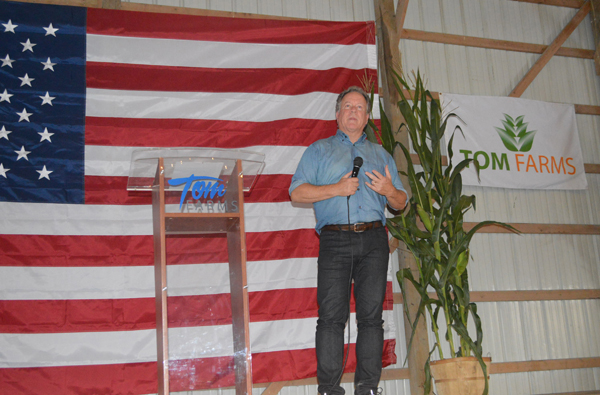
TIMES UNION REPORTS – Two hundred years ago, 94 to 95% of the world’s population was in extreme poverty. Today, less than 10% are in extreme poverty, said David Beasley, executive director of the World Food Programme, during the Tom Farms Annual Appreciation Event Thursday in Leesburg.
“So we have built systems around the world that supply more wealth and share more wealth than any time in world history,” Beasley, a former South Carolina governor, said. “But try telling that to the 10% we haven’t quite reached yet.”
Beasley said he tells young people to not tear down the system that’s helping the 90%, but to work and tweak the system until 100% of people are reached.
WFP works in over 85 countries, and in those countries 65% have man-made conflict, said U.S. Ambassador Kip Tom.
Tom said Beasley goes out into the world to deliver resources and making sure people are fed.
Beasley said he was helping do a story for “60 Minutes” a few years ago. He had just come out of Yemen and described it as a “horrific situation.”
The 2011 popular uprising that erupted in Yemen forced then-President Ali Abdullah Saleh out of power after 33 years of rule, against accusations of corruption and failed governance. After two years of consultations, the National Dialogue Conference presented a blueprint for a new federal map that partitioned Yemen into regions without considering socio-economic or regional grievances, according to Amnesty International’s website.
The Huthis then capitalized on popular discontent and consolidated their control over the governorate of Sa’da and neighboring areas in the northern parts of Yemen.
In September 2014, the Huthis managed to extend their territorial control, taking over a number of army and security positions in the capital Sana’a, according to the website. The war is still going on.
“You can’t imagine the war, the conflict, the suffering, the dying. I probably see more suffering and dying in a week than all you (in attendance) combined see in a lifetime,” he said.
At the end of the “60 Minutes” interview, Beasley was told he had the best job out there. He said his response was he doesn’t go to sleep thinking of all the children his organization saved, he goes to sleep thinking of all the children they couldn’t.
When his organization doesn’t have enough money or access, they have to choose which children eat and don’t eat, which children live and die, Beasley said.
There’s $400 trillion worth of wealth on the earth today, Beasley said. Last year, at the height of the COVID-19 pandemic, the world’s billionaires’ net worth increase was $5.2 billion per day.
“And to think a child anywhere in the world goes to bed hungry is a disgrace on humanity,” Beasley said, who said he’s not “a lefty,” but a conservative from South Carolina.
Beasley said when he was governor, South Carolina went from one of the worst unemployment rates in the U.S. to the top unemployment in the country. And he was able to do that by empowering the private sector because “we believe that we create wealth through the private sector.” His job was to pave a path to help the private sector.
When he got a call about a job with the WFP, he initially wasn’t interested, but said he doesn’t regret taking the job and it’s been the most fulfilling job he’s had.
Beasley said WFP goes with the mindset asking how it can create substantiality and resilience so they’re no longer needed.
“‘Cause charity, as good as charity is, charity is not a long-term solution. It’s empowering people,” Beasley said.
Last year, WFP fed 118 million people. This year, it’ll feed 138-140 million.
When Beasley took the job, there were 80 million “marching to starvation,” on the brink of starvation and not knowing where their next meal will come from. He thought they were on the brink of defeating world hunger, only to have the number jump to 135 million. When the COVID-19 pandemic hit, the number then jumped to 270 million.
Beasley laid out two main reasons for the jump of those on the brink of starvation. The number one reason was man-made conflict. Second was climate extremes in areas around the world, “which we deal with every single day.”
Those facing starvation aren’t just numbers, they are people. Of the 270 million people, 40 million are close to dying. Beasley said he could break down those people down to 43 countries “and I can tell you which countries are going be destabilized, or have famine or have mass migration.”
He can tell about those countries because his program’s spent so much time in those countries, noting he can usually tell about a year in advance which countries are going to call and what’s going to happen.
Beasley said he hasn’t met a beneficiary yet that’s wanted outside support.
“They don’t,” Beasley said. He said they don’t want to leave home. They want to take care of their families and a better way of life, and they’re struggling. He said they were struggling because “of corruption in leadership or extremist groups coming in or whatever it might be,” Beasley said. His job is to help solve the source of the problem.
Beasley said 85% of WFP’s expenditures are in war zones. He said people in war zones, like Syria, don’t want to leave, but if they don’t have any access to resources or security, they will. They will move two to five times in their home area before they will leave.
If they end up in Berlin or Brussels, “it costs us 50, 100 euros/dollars per day once they leave and have all these humanitarian support programs. And they don’t want to be there.”
He said he’d like to put WFP out of business, but world hunger is going in the opposite direction.
WFP received the Noble Peace Prize in 2020. Beasley said, “I thought I ought to be fired because our numbers were going up.” He said it’s heart-breaking to see what’s going on.
Beasley said he and people like Tom are trying to get the private sector involved more “in some of these developing countries to show them the way of success.”
Africa can feed the entire world, but there’s 30-50 years of money that’s been thrown out the window, he said. Beasley said the key is effective use of international aide.
Helping people doesn’t mean WFP creates dependency. That’s the worst kind of help, sometimes, Beasley said. “But if you’ve go a war or a cyclone or an earthquake, you want to come in and help people get on their feet. And that’s the World Food Programme.”




